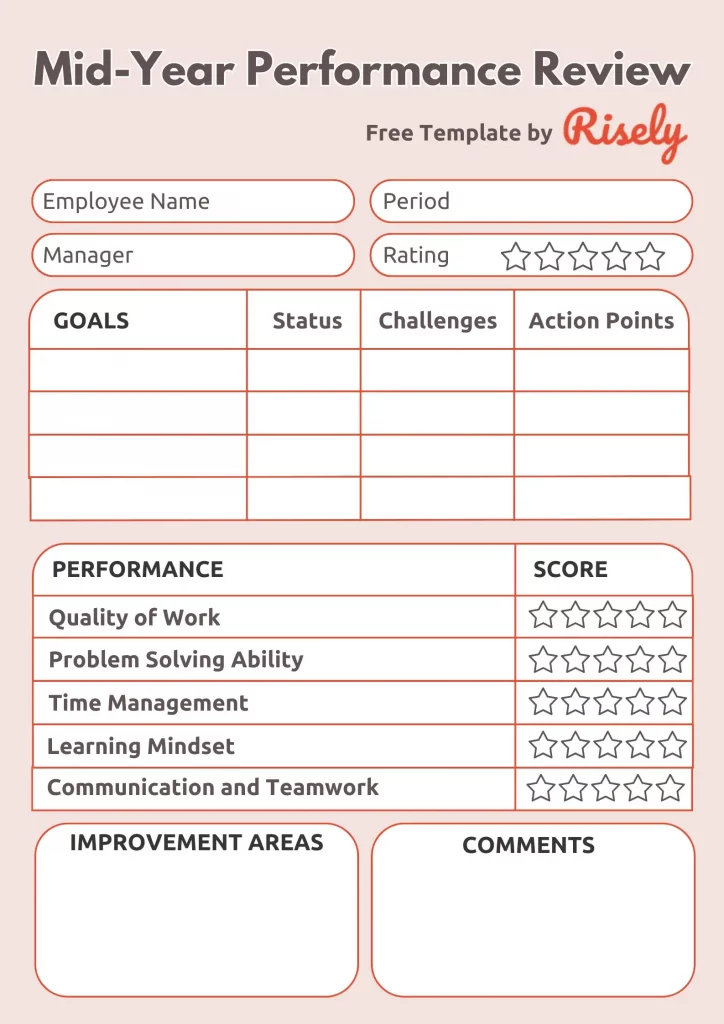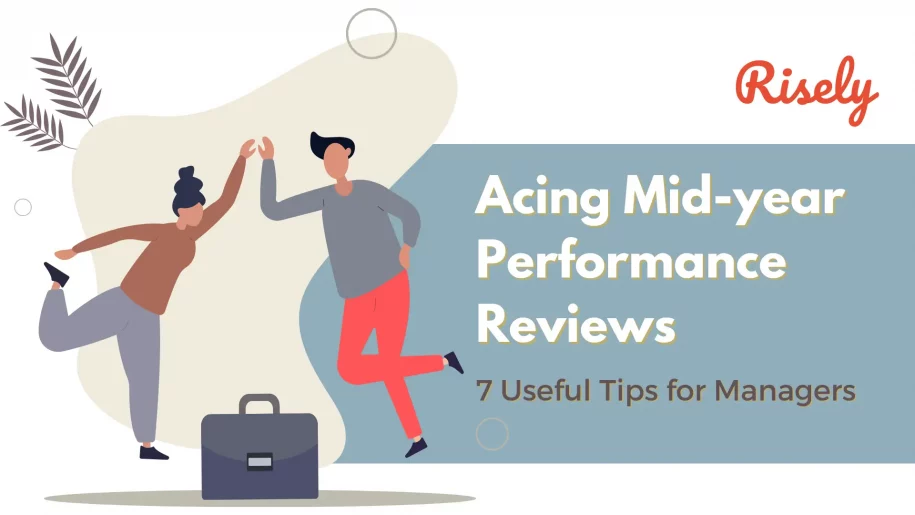Acing Mid-year Performance Reviews: 7 Useful Tips for Managers
As a manager, mid-year performance reviews can be pretty daunting. But they don’t have to be! Mid-year reviews allow managers to provide feedback and guidance to their employees while also setting goals for the year’s second half. In this post, we will cover all you need to know about conducting successful mid-year performance reviews. We will delve into the benefits of mid-year reviews, tips for preparing and conducting them effectively, sample questions to ask during the review process, and approaches to motivating employees during the review process. We will also discuss common challenges managers may face during these reviews and how to overcome them. With these six valuable tips, you can ace your mid-year performance reviews like a pro!- Acing Mid-year Performance Reviews: 7 Useful Tips for Managers
- Understanding Mid-Year Performance Reviews
- Tips for Preparing for Mid-Year Performance Reviews
- Effective Strategies for Conducting Mid-Year Performance Reviews
- Sample Questions to Ask During Mid-Year Performance Reviews
- Free Mid-year Performance Review Template for Managers!
- Approaches to Motivating Employees During Mid-Year Performance Reviews
- Overcoming Common Mid-Year Performance Review Challenges
- Conclusion
- Other Related Blogs
Understanding Mid-Year Performance Reviews
Mid-year performance reviews are evaluations that take place halfway through the year to assess an employee’s progress, achievements, and areas for improvement. These reviews typically involve a discussion between the employee and their supervisor or manager, where they review goals set at the beginning of the year, provide feedback on performance, discuss any challenges or obstacles faced, and make adjustments to goals or expectations as needed. Read more: Performance Management 101 for Leaders: 5 Steps to Ace the ProcessWhat is the Purpose of Mid-Year Performance Reviews?
Mid-year performance reviews aim to assess employee progress and performance, allowing for open conversations about job satisfaction and mental health. These reviews help identify any performance gaps and provide specific examples for improvement. Ultimately, they ensure employees are moving in the right direction.Benefits of Conducting Mid-Year Performance Reviews
Conducting mid-year performance reviews has numerous benefits. These reviews contribute to employee engagement and job satisfaction by providing a platform for open communication and feedback. They also help managers identify strengths and weaknesses, enabling better performance management. Additionally, mid-year reviews allow managers to address employees’ challenges and obstacles, fostering a culture of ongoing feedback and continuous improvement. Moreover, they provide an opportunity to reinforce company policies and expectations. Mid-year performance reviews are essential for enhancing employee performance and organizational success.Tips for Preparing for Mid-Year Performance Reviews
Setting Goals and Key Performance Indicators (KPIs)
Collaborating with employees is crucial when setting goals for the rest of the year. It ensures that the goals are challenging yet attainable. It’s essential to align individual goals with departmental and organizational objectives to drive success. Defining key performance indicators (KPIs) allows for effectively measuring progress and success. Goals should be SMART – specific, measurable, attainable, relevant, and time-bound. Involving employees in the goal-setting process enhances ownership and motivation. Employee feedback and input are valuable for a successful mid-year performance review. HR managers play a vital role in facilitating this process.Gathering Data and Documentation
Collecting performance data throughout the year is crucial to gather data and documentation for mid-year performance reviews effectively. It includes metrics, feedback, and achievements. It’s important to track both positive and negative incidents or occurrences related to employee performance. Reviewing previous performance reviews and documentation can help identify trends and patterns that get them in line for the team before the annual reviews come close. Seeking input from colleagues, stakeholders, and direct reports offers a comprehensive perspective. Documenting instances of recognition, accomplishments, and areas needing improvement provides valuable insights.Communicating Expectations and Guidelines
It is crucial to communicate performance expectations and review guidelines to employees beforehand to ensure a successful mid-year performance review. Provide them with an overview of the review process, including the timeline and format. Encourage open communication and create a safe space for employees to share their thoughts and concerns. Set guidelines for discussing strengths, areas for improvement, and professional development opportunities. Emphasize the importance of constructive feedback and the intention of supporting employee growth.Other Interesting Reads
Effective Strategies for Conducting Mid-Year Performance Reviews
Active Listening and Open Communication
During mid-year performance reviews, managers need to listen to their employees actively.It allows them to understand their experiences, challenges, and concerns. By practicing empathy and validating their feelings, managers create a safe and non-judgmental environment for communication. Asking open-ended questions encourages employees to share their thoughts and ideas freely. Managers must reflect on employee feedback and use it to improve their managerial practices. Managers can enhance employee engagement and performance by fostering active listening and open communication.Providing Constructive Feedback
When providing constructive feedback during mid-year performance reviews, it is essential to be specific and actionable, focusing on behaviors and actions. Take the time to highlight areas of strength and acknowledge employee accomplishments, helping to balance positive reinforcement with areas for growth and improvement. Offer suggestions for improvement and provide resources or support for development. Following up on previous feedback and tracking progress towards goals is also essential. By delivering constructive feedback effectively, HR managers can encourage employee growth and improve overall performance.Addressing Challenges and Opportunities
Encouraging team members to share any challenges they have faced and offering support openly is crucial during mid-year performance reviews. Managers should also take the opportunity to discuss potential opportunities for growth and development with their employees. By using open-ended questions, managers can stimulate dialogue about these challenges and opportunities, fostering a collaborative environment for problem-solving and brainstorming. Empowering employees to take ownership of their challenges and find solutions can lead to personal and professional growth.Identifying Areas for Improvement and Growth
It is essential to provide actionable feedback for areas that need improvement to ensure continuous growth and progress. Using specific examples, managers can illustrate the areas of strength and those that require growth. Additionally, targeted development opportunities can be discussed to enhance performance. Constructive feedback is vital in helping employees improve their skills and competencies. Creating a plan with actionable steps further ensures improvement and growth. Read more: How to Create Strong Individual Development Plans (With Examples)Sample Questions to Ask During Mid-Year Performance Reviews
Managers must ask insightful questions during mid-year performance reviews, encouraging meaningful dialogue. Discuss the goals accomplished since the last inspection and how effective time management skills were demonstrated. Explore specific examples of contributions to the team’s success and inquire about any challenges faced in achieving professional goals. Finally, inquire about the support or resources needed for employees to excel in their roles. Managers can gather valuable insights and guide further growth and development by asking these sample questions.Goal-Setting Questions
- What are your professional aspirations for the remainder of the year?
- How can we align your objectives with the company’s overall goals?
- Are there any additional training or development opportunities that can assist you in achieving your targets?
- What steps can you take to measure your progress towards these objectives?
- Lastly, how can I provide support to help you accomplish your goals?
Performance Evaluation Questions
- How satisfied are you with your job overall?
- Do you need more support or training in any particular areas?
- Can you provide examples of when you’ve demonstrated exceptional performance?
- Are there any company policies or procedures that hinder your performance?
- How can we enhance the performance evaluation to promote better employee engagement?
Learning and Development Questions
- What skills or knowledge have you acquired or improved upon since our last discussion about your development?
- Can you provide examples of applying what you’ve learned to your work?
- Are there specific areas or skills you would like to further develop in the coming year?
- Have you encountered any obstacles or challenges in your learning and development efforts? How did you overcome them?
- Are you satisfied with the training and development opportunities provided by the organization? If not, what additional resources or support do you need?
- What learning experiences (e.g., workshops, online courses, mentorship) have been most effective for you, and why?
Career Development Questions
- What are your aspirations for your career in the long run?
- How can we provide support to help you grow professionally within the company?
- Are there any leadership or cross-functional opportunities you want to explore?
- Can you explain how your current role aligns with your career goals?
- How can we create a development plan to assist you in achieving your career objectives?
Free Mid-year Performance Review Template for Managers!

Approaches to Motivating Employees During Mid-Year Performance Reviews
Recognition and Rewards Programs
Implementing an employee of the month program allows for the recognition of outstanding performance. Monetary incentives or bonuses can be offered to employees who meet or exceed their performance goals. Celebrating milestones and accomplishments through team-based rewards or celebrations helps foster a positive work environment. Providing opportunities for professional development and growth serves as a form of recognition. Recognizing employees’ achievements publicly, such as through company-wide announcements or newsletters, enhances employee feedback and motivation. HR managers can utilize these recognition and rewards programs to boost employee performance and engagement.Training and Development Opportunities
To support employee growth:- Offer online courses and workshops to enhance skills and knowledge.
- Provide on-the-job training and mentoring programs for hands-on learning.
- Encourage attendance at industry conferences or seminars to stay updated.
- Foster self-directed learning by providing access to educational resources.
- Create a culture of continuous development through regular training sessions.
Flexible Work Arrangements and Benefits
Offering flexible work options can significantly improve employee engagement and job satisfaction. During mid-year performance reviews, discussing the benefits of flexible work arrangements, such as improved work-life balance, is essential. Open-ended questions about the impact of flexible work arrangements on productivity and mental health can provide valuable insights. Additionally, sharing specific examples of employees who have benefited from flexible work arrangements can further emphasize their value. Managers can foster a supportive and adaptable work environment by incorporating these discussions into performance reviews.Overcoming Common Mid-Year Performance Review Challenges
To overcome common mid-year performance review challenges, managers must address time management challenges by setting clear expectations and priorities. By using performance management techniques, managers can identify areas for improvement and provide actionable steps for employees to enhance their performance for the rest of the year. Offering constructive feedback is crucial for guiding employee development and growth. Additionally, emphasizing the importance of ongoing feedback rather than relying solely on mid-year reviews can lead to more effective performance management.How to Handle Difficult Conversations with Employees?
Approaching difficult conversations with empathy and understanding is vital. Encourage employee participation and feedback by using open-ended questions. It’s essential to provide specific examples that support feedback to facilitate understanding. After the conversation, follow up with actionable feedback and create an improvement plan. It’s also essential to ensure that company policies are effectively communicated and followed during these challenging discussions. By handling difficult conversations with care and clarity, you can foster growth and development within your team.Conclusion
In conclusion, mid-year performance reviews are essential for managers to assess their team’s progress and provide feedback. Managers can effectively conduct these reviews by setting clear goals and expectations, gathering relevant data, and maintaining open communication. Providing constructive feedback to help employees identify areas for improvement and growth is crucial. Additionally, asking thoughtful questions about goals, performance, learning and development, and career advancement can facilitate meaningful discussions. Motivating employees during these reviews can be achieved through recognition programs, training opportunities, and flexible work arrangements. Overcoming challenges, such as handling difficult conversations and addressing skepticism about the review process, requires empathy and effective communication. By implementing these tips, managers can ace mid-year performance reviews and foster a positive work environment.Make performance reviews effective with good constructive feedback.
Take the free constructive feedback self-assessment for managers for free today to get detailed insights.
Other Related Blogs
How to build and retain high performing employees? | Laletha Nithiyanandan
How to build and retain high performing employees? | Laletha Nithiyanandan Are you really an HR if you have not spent hours chasing the ideal high performing employees for your…
How Can You Build A High Performing Culture? 7 Hacks
How Can You Build A High Performing Culture? 7 Hacks We have all heard of dream teams and tried to build them with varying levels of success and failure. Among…
10 Effective Manager Performance Goals to Drive Team Success
10 Effective Manager Performance Goals to Drive Team Success You’re sitting across from a manager in a performance review meeting. They seem unsure, disconnected from the company’s vision, and oblivious…
How to Build a High-Performing Team?
How to Build a High-Performing Team? Creating a high-performing team is a goal that every organization aspires to achieve. A high-performing team achieves superior results and can quickly adapt to…


